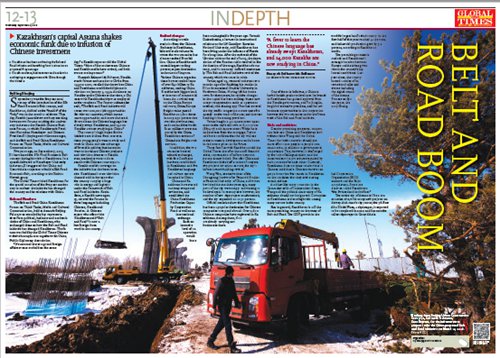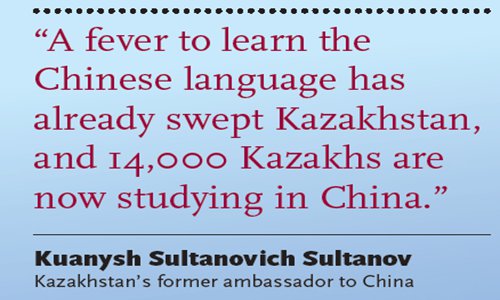Commentaries
Your Present Location: Teacher_Home> Wang Wen> CommentariesKazakhstan’s capital Astana shakes economic funk due to infusion of Chinese investment
Source: Global Times Published: 2018-9-25
September 7 was the five-year anniversary of the introduction of the Silk Road Economic Belt concept, and Kazakhstan, dubbed as the "buckle" of the "belt," was in the mood to celebrate. That day, Kazakh journalists were busy traveling between two forums marking the anniversary in Astana: the Kazakh-Chinese Business Forum, to which Kazakhstan's President Nursultan Nazarbayev and Chinese President Xi Jinping sent video messages, and the Belt and Road China-Kazakhstan Forum on Think Tanks, Media and Cultural Communication.
Five years ago, on September 7, 2013, Xi introduced the Silk Road Economic Belt concept during his visit to Kazakhstan. In a speech delivered at Nazarbayev University in Astana, Xi suggested that China and Central Asia cooperate to build a Silk Road Economic Belt, according to the Xinhua News Agency.

The Global Times visited Kazakhstan for the special occasion of the five-year anniversary to see how the initiative has changed the country and its relations with China.
Belt and Road era
The Belt and Road China-Kazakhstan Forum on Think Tanks, Media and Cultural Communication, held at Astana's Beijing Palace, was attended by key representatives from political, business and academic circles of China and Kazakhstan, who exchanged ideas on how the Belt and Road initiative has changed Kazakhstan. The forum was held by the Global Times Chinese website huanqiu.com together with China Public Diplomacy Association.
"It's unusual that two grand foreign affairs events are held on the same day," a Kazakh reporter told the Global Times. "Most of the mainstream Chinese and Kazakh media have arrived, and both events are important."
Kuanysh Sultanovich Sultanov, Kazakhstan's former ambassador to China from 1995 to 2001, recalled the time when China and Kazakhstan established diplomatic relations on January 3, 1992. As almost no Kazakhs spoke Chinese at that time, a Chinese with Kazakh ethnicity was employed as the translator. The former ambassador said, "The Belt and Road initiative will create over 200,000 job opportunities for relevant countries, which means more opportunities and more choices. A fever to learn the Chinese language has already swept Kazakhstan, and 14,000 Kazakhs are now studying in China."
The country's high hopes for the initiative are evident from conversations: young people want to study and work in China and take advantage of favorable policies; businessmen want to introduce Chinese products and television dramas to Kazakhstan; academics want to do research with Chinese counterparts.
Kazakh media's coverage on the initiative has also been intensive. Kazakhstan's state television channel said in its report that the country can play a huge role in energy and logistics under the framework of Belt and Road initiative. Kazinform, a Kazakh news agency, covered the forums in three languages including Chinese, Kazakh and Russian. A Chinese expert who often visits Kazakhstan said "Belt and Road" is now a hot foreign buzzword in the country.

Radical changes
According to trade statistics from the Chinese Embassy in Kazakhstan, bilateral trade volume between the two countries has almost reached $100 billion. China is Kazakhstan's second-largest trading partner, export destination and source of imports. Various Chinese organizations have extended loans of over $40 billion to Kazakhstan, making China Kazakhstan's biggest lender in terms of commercial loans. As a critical stop on the China-Europe rail route, China-Europe freight trains passed Kazakhstan 1,800 times in 2017, a 50 percent rise over the previous year, and commodities worth $120 million were transported by the China-Kazakhstan section of China-Asia freight train services.
In addition, the two countries boosted cultural exchanges, with five Confucius Institutes established in Kazakhstan and five Kazakhstan language and culture centers launched in China.
China and Kazakhstan have started currency swaps and settlement, and established the China-Kazakhstan Production Capacity Cooperation Fund as well as an international exchange.
Such an intensive level of cooperation would have been unimaginable five years ago. Yermek Duisenkozha, a lecturer in international relations at the LN Gumilyov Eurasian National University, said Kazakhstan has been living under the influence of Russia for a long time. After the outbreak of the Ukraine crisis at the end of 2013, the depreciation of the Russian ruble resulted in the devaluation of the tenge, Kazakhstan's currency, and its economy suffered enormously. The Belt and Road initiative revived the country, which was once in crisis.
Yernar, aged 23, returned to Astana two months ago after finishing his studies in Xi'an International Studies University in Northwest China. Having left his hometown for three years, he said the changes in the capital has been striking: buses now accept transportation cards as a payment method; ride-sharing app Uber has entered the city; traffic congestion occurs more frequently on the roads of Astana; and internet banking is becoming prevalent.
Yernar bought a 40-square-meter apartment in the city's old town at 6,000 yuan ($874.17) each square meter. While he is under stress from the mortgage, Yernar said he is confident that the city will see major economic development and a boom in real estate prices in the future.
Those familiar with Kazakhstan told the Global Times that after the 2008 financial crisis, construction of infrastructure in Astana almost halted. But after China and Kazakhstan kicked off a series of cooperative projects in various sectors, the city's infrastructure building revived.
Wang Wen, executive dean of the Chongyang Institute for Financial Studies at Renmin University of China, said when he visited Astana three years ago, many parts of the city were empty and waiting to be developed. In recent years however, the number of new skyscrapers mushroomed, and the city expanded 20 to 30 percent.
Official statistics show that Kazakhstan has been a popular destination for Chinese companies to expand abroad. Over 2,600 Chinese companies have registered in Kazakhstan. Among them, 600 are already carrying out businesses there.
One of them is Infinitus, a Chinese herbal health products developer. Its branch in Kazakhstan has gained approval from the Kazakh government, and Yu Jianglin, its global executive president, said he saw business opportunities in the cooperation between the two countries under the framework of the Belt and Road initiative.
Risks and ambitions
Despite promising prospects, cooperation between China and Kazakhstan isn't without risks. Wang told the Global Times that both countries should put more efforts into people-to-people communication, in addition to governmental cooperation. This, however, is challenged by the lack of bilingual talent, and the inconvenient visa procedures required by both countries for each other. Currently, Kazakhstan does not issue tourist visas to Chinese individuals. Chinese tourists can get 72-hour visa free transit in Kazakhstan on the condition that they arrive using certain airlines.
And just like many countries in the Commonwealth of Independent States, Wang said the political uncertainty of Kazakhstan should not be ignored. Corruption in Kazakhstan is also a high risk among many sectors in the country.
But in general, Kazakhstan is still the most promising country on the route of Belt and Road. The GDP growth in the world's largest landlocked country in the first half of this year reached 4.1 percent, and industrial production grew by 5.2 percent, according to Kazakhstan media.
The promising economic outlook and Kazakhstan's strategic location between Europe and Asia has given rise to the country's diplomatic ambitions. Last year alone, the country hosted a series of international talks and events including the eighth round of the Astana Process on Syrian peace, the 2017 Shanghai Cooperation Organisation (SCO) summit and the Expo 2017 Astana. Some media even called Kazakhstan "the Switzerland in the East."
The entire city of Astana is like a construction site, with many new projects underway. At Astana's city center, the 78-floor Abu Dhabi Plaza, a skyscraper, is expected to be completed in 2020 and become the tallest skyscraper in Central Asia.
Wang Wen is executive dean of the Chongyang Institute for Financial Studies at Renmin University of China.























































































 京公网安备 11010802037854号
京公网安备 11010802037854号





